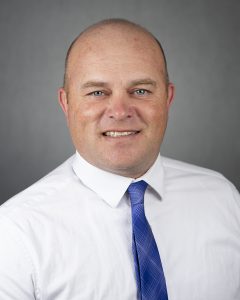by Olivia Doyle
GAINESVILLE, Fla. — Earlier this month, the Weed Science Society of America (WSSA) gave special recognition to a paper authored by University of Florida professor James Leary, honoring it as an Outstanding Paper in Invasive Plant Science and Management.

Leary, now a faculty member affiliated with the UF/IFAS Center for Aquatic and Invasive Plants (CAIP), conducted research in Hawaii for the paper, titled “Interpreting Life-History Traits of Miconia through Management over Space and Time in the East Maui Watershed, Hawaii.”
“We could not be happier that one of our team members was honored with such a prestigious award,” said Jason Ferrell, CAIP director. “Though it wasn’t Florida work, it still shows that UF/IFAS CAIP has hired one of the best and most competent scientists in the world.”
The paper describes an invasion of a tree species called miconia in the East Maui Watershed in Hawaii, a watershed producing over one billion gallons of fresh water used for agriculture and consumption and habitat to over 100 threatened and endangered species. The paper articulates the history and timeline of miconia management, recognizing it has reached numbers greater than can be realistically removed.
“It’s beyond eradication and, the point is, this doesn’t mean we throw in the towel,” Leary said. “It means we reprioritize our strategies towards protecting what we value the most, focusing in on the watershed functions and where they exist and where we can prevent miconia from destroying those remaining assets.”
Hawaii and Florida have a lot in common when it comes to invasive species.
“Few places have 12 months of near perfect environmental conditions for the reproduction and spread of invasive plants,” Ferrell said. “But Florida and Hawaii share this distinction and have historically been sentinel states for new invasives. Due to this fact, both states have developed some of the most advanced and integrated management programs found anywhere in the world.”
When Leary joined the UF faculty last year, he credited his experience in Hawaii for giving him the necessary preparation to jump into the wide range of research needed for invasive species management. The work on this paper in particular, he noted, developed his ability to assemble diverse or multiple disciplines, like economists who determined the dollar cost of the miconia problem.
Here in Florida, Leary hopes to become part of new teams in new areas of science contributing to invasive species management. He also hopes to bring students in who want to learn diverse aspects of what it takes to be successful in invasive species management.
It’s this ambition that Ferrell highlights as one of the keys to Leary’s success.
“It is one thing to do great research, but it is something else to then turn those concepts into an award-winning publication,” Ferrell said. “This award proves that Dr. Leary is not only a great scientist, but that he is also a finisher who doesn’t rest until the publication is complete. This is the ideal attitude for an ambitious researcher, and we can’t wait to see all the innovations he develops for Florida.”
-30-
The mission of the University of Florida Institute of Food and Agricultural Sciences (UF/IFAS) is to develop knowledge relevant to agricultural, human and natural resources and to make that knowledge available to sustain and enhance the quality of human life. With more than a dozen research facilities, 67 county Extension offices, and award-winning students and faculty in the UF College of Agricultural and Life Sciences, UF/IFAS brings science-based solutions to the state’s agricultural and natural resources industries, and all Florida residents.
ifas.ufl.edu | @UF_IFAS
 0
0
